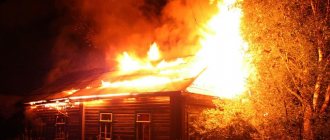Prices for legal services in criminal cases
Damage to someone else's property can be regarded as intentional or unintentional. The second case is of great interest to lawyers, since in some situations it is possible to professionally prove the facts that a person committed unlawful acts through negligence. Despite this, the line of defense must be built in strict accordance with the requirements and rules. Unintentional damage to property may be detected in the following cases:
- causing major damage;
- fires and other emergencies;
- serious consequences of the accident.
Damage to someone else's property is regulated by Article 168 of the Criminal Code of the Russian Federation. This area of the law determines the characteristics of the offense. According to state law, a crime can be considered completed if the object has suffered disproportionate damage or has been completely destroyed.
Damage, destruction or damage to someone else's property
The concept of “property damage” includes both violations subject to repair and destruction of the object. The following may lead to criminal or administrative liability for damage:
- quarrels with damage to personal belongings, clothing, accessories;
- home breakdowns that caused damage to neighbors’ apartments;
- minor accidents in the parking lot or accidental damage to a vehicle in the yard;
- careless or aggressive behavior in catering establishments, as a result of which equipment was damaged;
- family and other conflicts leading to damage or destruction of property;
- acts of vandalism and hooliganism, including in relation to municipal property: transport, equipping public gardens, street lighting.
Note!
In each case, the injured party has the right to protect its interests with the help of law enforcement agencies and in court. In addition to legal punishment, the violator, according to Article 1064 of the Civil Code of the Russian Federation, is obliged to compensate for the damage caused.
What qualifies as damage to someone else's property?
Damage to someone else's property implies the breakdown or complete destruction of something belonging to another person, in such a way that further use of the item for its intended purpose is possible only after repair and restoration work.
Unintentional damage to someone else's property can occur as a result of:
- failure to comply with safety measures when operating household electrical appliances;
- breakage of goods during loading and unloading operations;
- smoking in an unauthorized or unequipped place.
The subject of damage can be both movable and immovable property of a person. Unintentional damage can occur as a result of careless handling of fire, electrical equipment or other dangerous items.
Administrative liability for damage to property
The type of liability to which the violator will be held depends on the harm he caused. According to Article 168 of the Criminal Code of the Russian Federation, significant damage cannot be less than 5 thousand rubles. In this case, the losses must be significant for the victim, according to his current financial situation.
If the damage was caused deliberately, but the damaged item or the cost of repairing it cost less than 5 thousand and cannot be regarded as significant for the owner, then administrative punishment is applied to the violator under Article 7.17 of the Code of Administrative Offenses. The fine will range from 300 to 500 rubles.
If the cost of damage to property exceeds 5 thousand rubles and this is a significant amount for the owner, he will have to answer under criminal law. The final classification is influenced by the cost of damage and the motivation of the culprit.
At what age does criminal responsibility begin?
The age at which criminal liability begins under the laws of the Russian Federation is sixteen years.
There are circumstances listed in the legislation when responsibility can be assigned to a teenager who is fourteen years old; such a condition is intentional damage to property under aggravating circumstances. For example, deliberate arson of a property, which resulted in serious damage to human health or the act resulted in death.
Criminal liability for damage to property - Article 168 of the Criminal Code of the Russian Federation
Article 168 of the Criminal Code regulates sanctions for those whose careless manipulations with sources of increased danger - fire, electricity, transport - unintentionally led to large material losses for others. These are considered losses in excess of 250 thousand rubles. Particularly large - from 1 million.
The article's sanctions include:
- fine up to 120 thousand rubles;
- various terms of correctional and compulsory labor;
- imprisonment for up to a year.
Classification of consequences for property damage
State legislation regulates a number of consequences that may be considered in Article 168 of the Criminal Code of the Russian Federation:
- causing serious harm to the health of a person or group of people;
- dare a person or group of people;
- people injured during the crime were left without housing or means of subsistence;
- the activity of the enterprise was suspended (or was completely completed);
- the residents of the house were isolated from important resources (gas, water, electricity).
It is important to consider the complexity of the punishment. In view of this, the result of an incident in the form of the death of a person or group of people will be classified as a crime under Articles 168 and 109 of the Criminal Code of the Russian Federation.
Punishments provided for by law
State legislation provides for various penalties under this article. The specifics of the charge always depend on the severity of the crime committed and the person’s involvement in its commission. There are situations in which a citizen is found only partially guilty of what happened.
In this case, the person’s affiliation is considered indirect. Most often, the perpetrator is punished with fines, correctional and forced labor. The highest degree of punishment is imprisonment for up to one year.
Author of the article
Dmitry Leonov
Work experience 15 years, specialization - housing, family, inheritance, land, criminal cases.
Author's rating
721
Articles written
712
about the author
Punishment for intentional actions
Deliberate destructive actions against someone else's property are classified under Article 167 of the Criminal Code of the Russian Federation. The monetary minimum for intentional damage is lower than for unintentional damage - from 5 thousand rubles. In this case, the attacker could be:
- fined up to 40 thousand rubles or within 3 average monthly salaries;
- punished by forced or correctional labor;
- arrested for 3 months or imprisoned for up to 2 years.
If property was destroyed by explosion, arson, or other socially dangerous methods, or people were injured in addition to property, the defendant faces up to 5 years of forced labor or imprisonment.
Note!
A separate punishment in the Criminal Code is provided for cases of damage to municipal property and transport, and desecration of structures. According to Article 214, these actions are classified as vandalism and entail a fine of up to 40 thousand rubles, correctional labor for a year or arrest for 3 months.
Damage to state property due to negligence
The Criminal Code of the Russian Federation has a separate article for causing property damage through negligence to military installations. This refers to ammunition, weapons, and other items. Mandatory conditions for bringing to responsibility for causing damage to this property through negligence: destruction or damage to objects, as well as grave consequences of the actions of criminals.
The sanctions for such acts are stricter. The following liability applies for causing material damage through negligence:
- fine up to 200 thousand rubles;
- restrictions on service in the ranks of the RF Armed Forces for up to 2 years;
- arrest for up to six months;
- detention in a disciplinary military unit for up to 2 years;
- imprisonment for the same period.
Proof of property damage
To bring the offender to justice, you should immediately contact the police. At the request of a citizen, law enforcement agencies check the circumstances, collect eyewitness statements and evidence. If the appeal occurs after the fact, the owner of the damaged property should prepare:
- documents for the damaged item: papers on ownership of large objects, sales receipts for personal items, registration certificates;
- photo of the damage caused;
- list of eyewitness contacts.
If the incident occurred in a place where there are CCTV cameras, the recordings will help restore the picture of the incident for both law enforcement and the court.
Determining the value of things
To classify the offense under administrative or criminal law, an examination within the framework of the preliminary investigation will be assigned by the police officer in charge of the case. Depending on the nature of the property, experts will focus on:
- purchase price or current market value of similar objects;
- make, model, brand of the manufacturer of the lost equipment;
- the extent of damage and the possibility of complete restoration of the object.
If it is assumed that funds for damage will have to be recovered in court, the owner of the damaged property can order a specialized independent examination.
Where to contact an injured citizen
In order to hold a person accountable for causing unintentional damage to someone else’s property, the owner of the damaged object must file a complaint with law enforcement agencies.
The statement states:
- name of the authority;
- information about the applicant;
- circumstances of the offense;
- date and signature of the applicant.
Evidence of the guilt of the person who damaged the property may be attached to the application. The police conduct an investigation, after which the case is sent to court to determine the penalty.
The election of a penalty does not automatically cover the damage caused to the owner of the damaged property. This means that if the victim wants to compensate for the costs incurred to restore the damaged item, then he needs to submit an additional claim for damages to the court.
The application is sent to the court hearing the case of property damage. If the amount of damage is up to 50,000 rubles, then it is necessary to apply to the magistrate’s court, if above the specified amount - to the district judicial authority.
Even if the court makes an acquittal, this will not prevent the injured citizen from recovering damages from him.
Careless damage to someone else's property
The key condition for bringing to administrative liability is the intentionality of actions, even in the case of small material damage, and for criminal liability - premeditation, the amount of harm and the circumstances of the incident.
If the damage was caused through negligence without intent on the part of the culprit, the amount of damage is not large, and the circumstances are not related to careless handling of sources of increased danger, the culprit should not be held liable. He remains obligated to fully compensate for the damage caused.
There are no criteria for determining unintentionality. The decision is made by law enforcement officers during the initial proceedings and by the court. It is in the defendant’s interests to reach a peaceful agreement with the victim or to seek the services of a lawyer.
Note!
In everyday cases of damage to property due to negligence, the culprit can be helped by paragraphs 2 and 3 of Article 1064 of the Civil Code of the Russian Federation, which exempt him from liability if he proves his innocence in what happened or that the actions that led to the damage were initiated by the victim.
Features of the qualification of the crime
Punishment under the article for unintentional damage to someone else's property can be obtained both for damage to things and real estate. Since one of the mandatory conditions for qualifying an act under this article is careless handling of sources of increased danger.
The law understands careless handling of fire as a violation of rules developed at the state level or in a specific organization. They are prescribed in laws, regulations, and instructions of organizations. All employees must be familiar with the safety requirements upon signature.
Careless handling of fire may include:
- use of flammable substances near combustible materials;
- improper operation of equipment or technical devices;
- using defective equipment.
This also includes situations in which workers forget to turn off electrical appliances, leave stoves, gas burners, etc. unattended.
As we noted above, unintentional damage to property means both its damage and destruction. In the first case, we are talking about actions as a result of which further operation of the object is impossible without its repair, in the second we mean bringing the object or real estate into absolute disrepair.
For causing damage to property through negligence, punishment under the Criminal Code of the Russian Federation can be imposed from the age of 16. If such actions are committed by an official, they can be qualified under Art. 286 of the Criminal Code of the Russian Federation. It determines responsibility for exceeding authority.
The purpose and motives of criminals are examined by the court in order to separate the act from similar ones, for example, hooliganism.
Note!
If people died as a result of unintentional damage to property, then a sanction will also be imposed for causing death by negligence.






